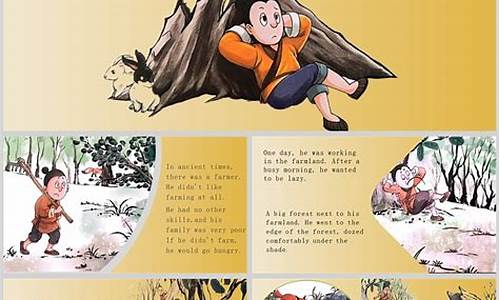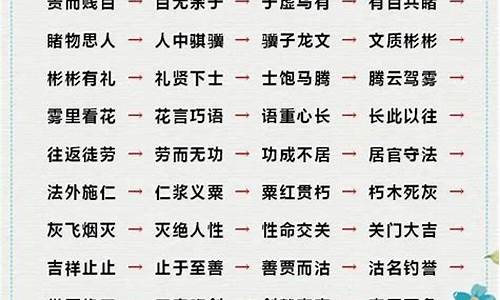中国成语的英文_中国成语的英文翻译
大家好,很高兴能够为大家解答这个中国成语的英文问题集合。我将根据我的知识和经验,为每个问题提供清晰和详细的回答,并分享一些相关的案例和研究成果,以促进大家的学习和思考。
1.念念有词是成语吗
2.穿凿的意思
3.英语版中国成语故事

念念有词是成语吗
念念有词是成语。:
成语(拼音:chéngyǔ,英文:idiom)是汉语词汇中定型的词。成语,众人皆说,成之于语,故成语。成语多为四字,亦有三字,五字甚至七字以上。
成语是中国传统文化的一大特色,有固定的结构形式和固定的说法,表示一定的意义,在语句中是作为一个整体来应用的,承担主语、宾语、定语等成分。
成语有很大一部分是从古代相承沿用下来的,它代表了一个故事或者典故。有些成语本就是一个微型的句子。成语又是一种现成的话,跟习惯用语、谚语相近,但是也略有区别。
成语一共有5万多条,其中96%为四字格式,也有三字、五字、六字、七字以上的成语。如“五十步笑百步”、“闭门羹”、“莫须有”、“欲速则不达”、“醉翁之意不在酒”等。成语一般用四个字,这大概是因为四字容易上口。
如我国古代的诗歌总集《诗经》,就以四字句为多,古代历史《尚书》,其中四字句也有一些。后来初学读的三、百、千:《三字经》《百家姓》《千字文》,其中后两种即全为四字句。
《四言杂字》《龙文鞭影》初、二、三集,都是四言。这虽然是训蒙书,也足以说明四字句之为人所喜爱、所乐诵。古人有些话,本来够得上警句,可以成为成语。只是因为改变为四字,比较麻烦,也就只好把它放弃,作为引导语来用。
例如"宋朝范仲淹的《岳阳楼记》,有"先天下之忧而忧,后天下之乐而乐"之语,意思很好,但因字数较多的关系,就没能形成成语,我们只能视为警句,有时可以引入文章。
而如"吃苦在前,享乐在后",就容易说,容易记,便可以成为成语。而同在《岳阳楼记》中的一句"百废俱兴",因为是四个字,所以就成了成语。
穿凿的意思
坐井观天
In an abandoned well, there lived a frog. One day, the frog in the well and met a big turtle from the east sea.
The frog proudly to the sea turtle boast said: "you see, I live here how comfortable! I'm hy, just jumping in the well and play, is tired to the ce wall of the rest. Sometimes the body and comfortable bubble in the water, sometimes hily in the mud for a walk. You see those small bug, beside the crabs and tadpoles, they who can compete with me! I am alone occupy the mouth abandoned well how free! Sir, why don't often go to the well to watch play?"
The sea turtle listened to the frog's a talk, they want to get into the well see. But, it left foot is still not fully extend go in, right foot was well caught by the column. It had to step back, put it to see the scene told the frog: "he you seen the sea? The sea, more of the broad masses of the Trinidad; the depth of the sea, far more than thousand cubits. In ancient times, ten years in nine years, the water of the sea is not so flood increase; eight years will he seven years, and the sea but not make drought thus reducing the sea from drought. Influence, live in the vast expanse of the sea is the real hiness
英语版中国成语故事
穿凿的意思:凿通;凿穿。非常牵强地解释,硬说成具有某种意思。成语(拼音:chéng yǔ,英文:idiom)是汉语词汇中定型的词。成语,众人皆说,成之于语,故成语。成语多为四字,亦有三字,五字甚至七字以上。
成语中国传统文化的一大特色,有固定的结构形式和固定的说法,表示一定的意义,在语句中是作为一个整体来应用的,承担主语、宾语、定语等成分。
成语有很大一部分是从古代相承沿用下来的,它代表了一个故事或者典故。有些成语本就是一个微型的句子。成语又是一种现成的话,跟习惯用语、谚语相近,但是也略有区别。成语是中华文化中一颗璀璨的明珠。
古代汉语词汇有的一种长期相沿用的固定短语,来自于古代经典或著作、历史故事和人们的口头故事。成语的意思精辟,往往隐含于字面意义之中,不是其构成成分意义的简单相加。它结构紧密,一般不能任意变动词序,抽换或增减其中的成分。
其形式以四字居多,也有一些三字和多字的,大多由四字组成。
简单的说,成语就是,说出来大家都知道,可以引经据典,有明确出处和典故,并且使用程度相当高的用语。成语跟专名、科学术语、谚语、歇后语、引语和由四个字组成的普通词组,从某些方面看来,也有相似之处。
譬如专名和科学术语都是固定词组;谚语、歇后语、引语不仅是固定词组或句子,而且意味也有些与成语相似。四个字组成的普通词组比较简练,形式跟绝大多数的成语一样,如东西南北、春夏秋冬之类,但是这些都不是成语。
把成语跟专名、科学术语等的区别搞清楚,这就有助于断定什么是成语,什么不是成语。
简单地就这方面作些说明。成语则是表示一般概念的,例如”七零八落“这个成语,既可以用来形容开败了的花朵,又可以用来形容被打败的军队,也可以用来形容稀疏零散的人群。又如津津有味这个成语,可以用来描述任何一个人对于某些事物特别感觉有兴趣。
江郎才尽
Southern Dynasties of Jiang Yan, word Wen-tung, when he was young, became a Dingdingyouming writer, his poems and articles at the time received high acclaims. However, when he is getting older, he has not previously written an article good, but a lot of setbacks. His poems written in prosaic; and pick up a pen-yin grip for a long time, still can not write a word, the occasional inspiration came; poem written, but the textual Kuse, content, plain were completely useless. So some people to legend, once a boat parked in Chan Jiang Yan-Ling Monastery river and dream of a self-named Zhang Jingyang person; to his followers repay a silk, he would arrest a few feet from her, he is also silk. Thus, his article there will be no wonderful. It was also legend; once the rule of Jiang Yan in the booth sleeping too; dreamed that a person claiming to Guo Pu, walked over to his side, his claim to the pen, said to him: "Man Michie, I he a pen in your place has been a long time, and now should be able to give it to me the bar! "Jiang Yan heard, they dig out from his arms, he is also a five-color pen. Reportedly Since then, Jiang Yan on Evans exhausted and could not write the article in any good.
Jiang Yan's talent has not really run out, but he was an officer after the one hand, as the Chief busy, on the other hand also because of career proud of, without their own write, to sweat, they did not write the. Over time, the article will bring out less, lacking in talent. (Excerpt from "Practical Writing" 1995 No. 8 "I hope," Jiang "was not exactly")
南朝的江淹,字文通,他年轻的时候,就成为一个鼎鼎有名的文学家,他的诗和文章在当时获得极高的评价。 可是,当他年纪渐渐大了以后,他的文章不但没有以前写得好了,而且退步不少。他的诗写出来平淡无奇;而且提笔吟握好久,依旧写不出一个字来,偶尔灵感来了;诗写出来了,但文句枯涩,内容 平淡得一无可取。于是就有人传说,有一次江淹乘船停在禅灵寺的河边,梦见一 个自称叫张景阳的人;向他讨还一匹绸缎,他就从怀中拘出几尺绸缎还他。因此,他的文章以后便不精彩了。又有人传说;有一次江淹在冶亭中睡午觉;梦见一个自称郭璞 的人,走到他的身边,向他索笔,对他说:“文通兄,我有一支笔在你那儿已经很久了,现在应该可以还给我了吧!” 江淹听了,就顺手从怀里取出一支五色笔来还他。据说从此以后,江淹就文思枯竭,再也写不出什么好的文章了。
其实并不是江淹的才华已经用完了,而是他当官以后,一方面由于政务繁忙,另一方面也由于仕途得意,无需自己动笔,劳心费力,就不再动笔了。久而久之,文章自然会逐渐逊色,缺乏才气。(节选自《应用写作》1995年第8期《但愿“江郎”才不尽》)
非常高兴能与大家分享这些有关“中国成语的英文”的信息。在今天的讨论中,我希望能帮助大家更全面地了解这个主题。感谢大家的参与和聆听,希望这些信息能对大家有所帮助。
声明:本站所有文章资源内容,如无特殊说明或标注,均为采集网络资源。如若本站内容侵犯了原著者的合法权益,可联系本站删除。










